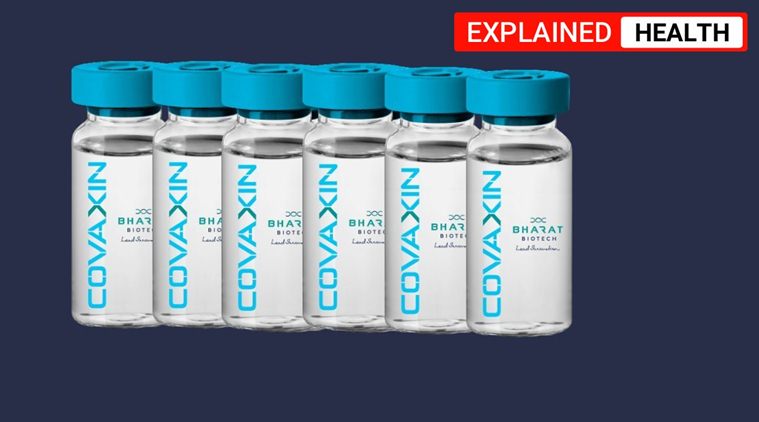- India
- International
ICMR wants to launch Covaxin by August 15: What you need to know about India’s vaccine
ICMR has targeted August 15 launch for Covid-19 vaccine. How much remains in the trial process? How have other vaccine candidates progressed?
 Covaxin Covid-19 vaccine trials: The Drug Controller General of India, who heads apex drug regulatory body Central Drugs Standard Control Organisation (CDSCO), has given BBIL approvals for phase I and II clinical trials so far.
Covaxin Covid-19 vaccine trials: The Drug Controller General of India, who heads apex drug regulatory body Central Drugs Standard Control Organisation (CDSCO), has given BBIL approvals for phase I and II clinical trials so far.
On Thursday, Indian Council of Medical Research (ICMR) head Dr Balram Bhargava on July 2 wrote to all 12 trial sites for the Covid-19 vaccine candidate, Covaxin, that all clinical trials had to be completed by August 15, in time for a public launch. Bioethics experts, however, have questioned how all three phases of testing for a vaccine candidate yet to even begin human trials can be crunched into a timeframe of a month.
What is Covaxin?
It has been developed by the company Bharat Biotech India (BBIL) in collaboration with ICMR’s National Institute of Virology (NIV). It is an “inactivated” vaccine — one made by using particles of the Covid-19 virus that were killed, making them unable to infect or replicate. Injecting particular doses of these particles serves to build immunity by helping the body create antibodies against the dead virus, according to BBIL.
When does ICMR aim to launch it?
Aiming to make it available for public use by August 15, Bhargava wrote to the 12 trial sites to ensure “all” clinical trials were conducted by then. While BBIL’s application with the Clinical Trials Registry of India (CTRI) shows it plans to complete enrolment of trial participants by July 13, Bhargava has directed the sites to complete enrolment by July 7.
Is this achievable?
A vaccine usually goes through three phases of human trials. The Central Drugs Standard Control Organisation has given approvals for phase I and II trials so far. According to details from CTRI, BBIL in its application estimated phase I and II trials to take a year and three months, including at least a month for phase I alone.
ICMR defends August 15 Covid vaccine deadline, says process ‘as per global norms’
Experts have questioned how all three phases can be concluded within a month and a half. “I would find it very surprising if it is done. Even the most ambitious companies in the world that are in more advanced stages of development for their Covid-19 vaccines have a longer time-frame. Even having all the trial results, with safety and efficacy data, by August 15 is difficult. This raises several questions,” said Dr Anant Bhan, Researcher, Global Health, Bioethics and Health Policy.

“This should not be done at the cost of efficacy and safety,” said Dr Shashank Joshi, Dean of the Indian College of Physicians.
While vaccine trials can be fast-tracked, it still takes over a year to launch the product, experts said. In a pandemic, emergency-use approval can be given if data from the first two trial phases is compelling enough, said an expert on condition of anonymity. This would allow the launch without the third phase being conducted, but this approval would likely be given with riders to submit additional data and adverse event reports.
📣 Express Explained is now on Telegram. Click here to join our channel (@ieexplained) and stay updated with the latest
What other types of vaccine candidates are being studied?
Over 100 vaccines are being tested globally, including inactivated and various other types. Some of the frontrunners include:
Non-replicating viral vector
The SARS-CoV-2 virus uses the spike on its surface, the ‘spike protein’, to enter and infect cells and multiply. A non-replicating viral vector vaccine uses a weakened version of a different virus to carry this Covid-19 spike protein into the body, but it is modified not to replicate. This allows the body to recognise the spike protein as a threat and build immunity so that it can attack the real virus if it tries to infect the body.
FRONTRUNNERS: The University of Oxford, in collaboration with AstraZeneca, is testing one such vaccine using the ChAdOx1 virus, a weakened version of a common cold virus that causes infections in chimpanzees. This vaccine has already progressed to phase- III trials stage and will, at the earliest, only be available towards the end of the year.
CanSino Biological, in collaboration with the Beijing Institute of Biotechnology, is testing another using the adenovirus type 5 vector. This vaccine was given special permission for use in its military personnel in June.
RNA vaccine
These use messenger RNA (mRNA) molecules that tell cells what protein to build. In this case, the mRNA is coded to tell cells to build the molecular structure on the surface of SARS-Cov-2 — which the immune system will recognise and build antibodies against.
FRONTRUNNERS: Moderna, in collaboration with the US National Institute of Allergy and Infectious Diseases, has worked on an mRNA vaccine that is expected to start phase III trials this month.
Pfizer (in collaboration with Germany’s BioNTech) has been giving patients its experimental RNA vaccine at low- and mid-level doses. Mikael Dolsten, Pfizer’s president of world-wide research and development, said recently that a Phase IIb/II study the company expects to begin this month could finish recruiting patients by August or September. A launch is expected by the end of the year.
DNA vaccine
These vaccines use genetically engineered DNA molecules that, again, are coded with the antigen against which the immune response is to be built.
FRONTRUNNER: Inovio Pharmaceuticals, in collaboration with the International Vaccine Institute, has a DNA vaccine INO-4800 already in phase I trials. On June 30, it announced positive interim results from the first six weeks of this trial. It plans to initiate a phase 2/3 efficacy trial this summer “upon regulatory concurrence”.
In India, Zydus Cadila on Thursday received approval to initiate human trials for its DNA vaccine. Zydus expects to complete phase I and II trials for in three months.
EXPRESS OPINION
Apr 24: Latest News
- 01
- 02
- 03
- 04
- 05









































